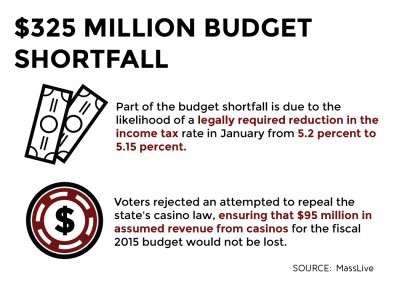
Massachusetts Gov. Deval Patrick’s administration announced plans Thursday to implement budget cuts to address a $325 million budget deficit in the state’s $36.5 billion 2015 fiscal year budget.
One of the main reasons for the budget gap is a legally required tax reduction that will take effect in January, said Secretary for Administration and Finance Glen Shor in a Thursday press briefing.
“The gap exists principally because the personal income tax rate is likely to be reduced, representing a $70 million loss in [the 2015 fiscal year], and fees and reimbursements are not achieving the levels predicted in the budget,” he said. “The tax rates would be reduced in January from 5.2 percent to 5.15 percent. The mandatory tax cuts depend on year-to-year revenue growth compared to inflation, and the low inflation rate has made them much more likely.”
Shor said Patrick seeks to balance the budget with a package of spending cuts rather than drawing from the state’s reserves to fill the gap.
“We are going to solve the gap through spending reductions,” he said. “We will be back in two weeks with a package of spending reductions to solve that gap.”
In July, Patrick asked the Legislature for the power to cut more programs if necessary, but Shor said this was not in anticipation of the budget gap.
“We asked to have the full range of tools that we believe is necessary to most effectively manage budgets,” Shor said. “It wasn’t counting on this circumstance, but it was based on our experience managing budgets, and one key feature of authority that we asked for was the ability, if circumstances ultimately warranted emergency spending reductions, the ability to do so not only targeted at executive branch agencies but also at non-executive branch agencies.”
Shor said the administration waited until after the midterm election to announce the cuts because they were not sure if they would lose the $95 million of revenue from casinos if residents voted against keeping the casinos in Massachusetts on the ballot.
The administration plans to solve the problem before Governor-elect Charlie Baker takes office in January. Andrew Bagley, director of research and public affairs of the Massachusetts Taxpayer Foundation, however, said this would most likely not be the case.
“Well, $325 [million] is probably a very lowball estimate of what the problem we’re going to face in [the 2015 fiscal year will be],” he said. “We estimated probably at least $500 million, could be a couple hundred million higher. It could be as much as twice what the governor is proposing to address.”
While the administration has taken the proper steps to address the deficit, the foundation expects there to be future problems that Baker “will have to deal with,” Bagley said.
“We think the administration has taken the right step in beginning to address $325 million of that. But we expect there will be future problems,” he said. “This is roughly a $38 billion budget, and he’s going to cut roughly $325 million. He [Patrick] can’t cut from local aid, he can’t cut from higher education, he can’t cut from constitutional offices, he can’t cut from the legislature, so this will come from the executive branch, but we have no data to show exactly what he will propose.”
Several residents said they are not surprised that the Commonwealth is in debt, and explained which areas of government they thought should be cut more than others.
Jamaal Simmons, 33, of Roxbury, said education and health care are two areas of the government areas that should be left alone.
“We all know what’s important,” he said. “Education and health care should be left alone or given more funds. We could use that. There are so many things in our day-to-day lives to think about and imagine.”
Yukun Jia, 24, of Watertown, reaffirmed Simmons’ belief that health care and education should be left alone, and said Baker would need to address these issues when he takes office.
“Baker will have some things he’ll need to address [when in office] regardless,” she said. “It [the budget] is such a big project that takes time, and it’s hard to get onto the same page and move forward before the next person comes in. Patrick can hope he’ll finish. Hope doesn’t mean we will.”
Mina Corpuz contributed to the reporting of this article.






















































































































